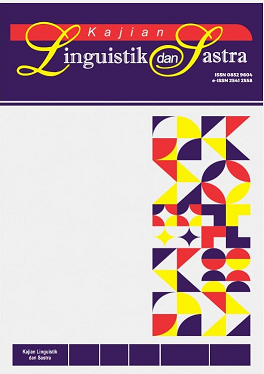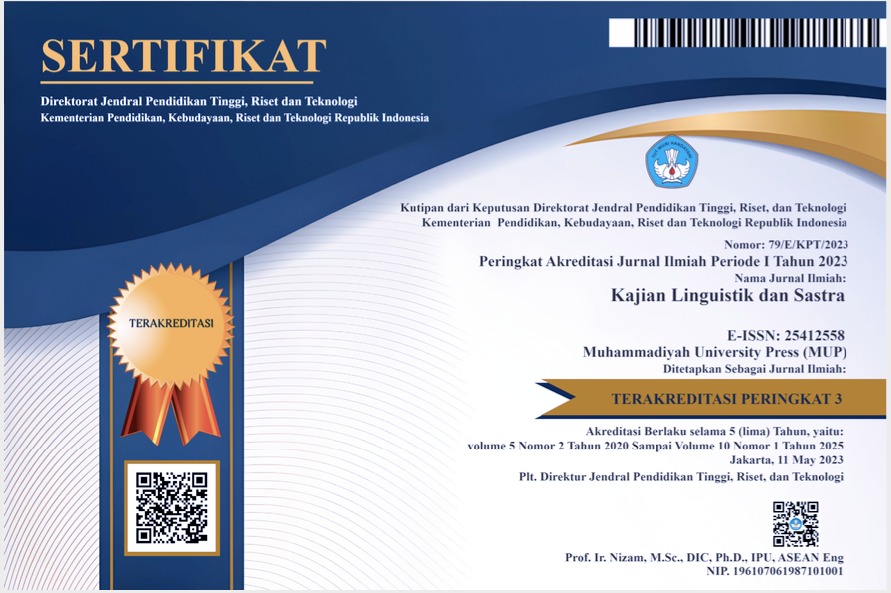Implementasi E-Assessment dalam Pembelajaran Teks Ceramah Berbasis Culturally Responsive Teaching di Pondok Pesantren Modern Islam Assalaam
DOI:
https://doi.org/10.23917/kls.v9i2.7662Keywords:
E-Assessment, Lecture Text Learning, , Culturally Responsive TeachingAbstract
The urgency of implementing Culturally Responsive Teaching (CRT) and E-Assessment in sermon text learning lies in the need to enhance the relevance of teaching materials to the cultural and religious backgrounds of students while providing more objective and efficient assessments. This study aims to analyze the effectiveness of combining CRT and E-Assessment in improving students' competencies at Pondok Pesantren Modern Islam Assalaam, particularly in sermon text learning. The study employed a qualitative approach with an embedded case study design. Data were collected through in-depth interviews, participatory observations, documentation, and audio-video recordings. Thematic analysis was conducted to identify patterns in teaching and technology-based assessment practices. The results show that CRT enhances the relevance of learning materials to students’ cultural contexts, boosting confidence, participation, and intercultural understanding. Meanwhile, E-Assessment provides a more objective and efficient tool for evaluating sermon texts, particularly in terms of structure, coherence, and language use. However, the study also highlights challenges, such as limitations in assessing the performative aspects of speaking skills and the need for more inclusive material development. The study concludes that the combination of CRT and E-Assessment is effective in supporting students' competency development, although further innovations are needed in technology integration and teacher-student training.
Downloads
References
Referensi
S. Alhanachi, L. A. L. de Meijer, and S. E. Severiens, “Improving culturally responsive teaching through professional learning communities: A qualitative study in Dutch pre-vocational schools,” Int. J. Educ. Res., vol. 105, 2021, doi: 10.1016/j.ijer.2020.101698. DOI: https://doi.org/10.1016/j.ijer.2020.101698
P. I. Chou, M. H. Su, and Y. T. Wang, “Transforming teacher preparation for culturally responsive teaching in Taiwan,” Teach. Teach. Educ., vol. 75, 2018, doi: 10.1016/j.tate.2018.06.013. DOI: https://doi.org/10.1016/j.tate.2018.06.013
L. Hutchison and L. McAlister-Shields, “Culturally responsive teaching: Its application in higher education environments,” Educ. Sci., vol. 10, no. 5, 2020, doi: 10.3390/educsci10050124. DOI: https://doi.org/10.3390/educsci10050124
Astalini, D. A. Kurniawan, U. Sulistiyo, R. Perdana, and Susbiyanto, “E-assessment motivation in physics subjects for senior high school,” Int. J. online Biomed. Eng., vol. 15, no. 11, 2019, doi: 10.3991/ijoe.v15i11.10843. DOI: https://doi.org/10.3991/ijoe.v15i11.10843
B. Bahati, U. Fors, P. Hansen, J. Nouri, and E. Mukama, “Measuring learner satisfaction with formative e-assessment strategies,” Int. J. Emerg. Technol. Learn., vol. 14, no. 7, 2019, doi: 10.3991/ijet.v14i07.9120. DOI: https://doi.org/10.3991/ijet.v14i07.9120
M. E. Caingcoy, V. I. M. Lorenzo, I. A. L. Ramirez, C. D. Libertad, R. G. Pabiona, and R. M. C. Mier, “Assessing Practice Teachers’ Culturally Responsive Teaching: The Role of Gender and Degree Programs in Competence Development,” IAFOR J. Cult. Stud., vol. 7, no. 1, 2022, doi: 10.22492/ijcs.7.1.02. DOI: https://doi.org/10.22492/ijcs.7.1.02
M. Appiah and F. van Tonder, “E-Assessment in Higher Education: A Review,” Int. J. Bus. Manag. Econ. Res., vol. 9, no. 6, 2018.
Y. H. Lai, “Multi-ethnic computational thinking and cultural respect in unmanned aerial vehicle-assisted culturally responsive teaching,” Front. Psychol., vol. 14, 2023, doi: 10.3389/fpsyg.2023.1098812. DOI: https://doi.org/10.3389/fpsyg.2023.1098812
C. D. Nguyen and T. N. Huynh, “Teacher agency in culturally responsive teaching: learning to teach ethnic minority students in the Central Highlands of Vietnam,” Educ. Rev., vol. 75, no. 4, 2023, doi: 10.1080/00131911.2021.1974346. DOI: https://doi.org/10.1080/00131911.2021.1974346
C. M. Douglas, “A Case Study for Culturally Responsive Teaching in Glodok, Jakarta, Indonesia: The Negotiation of Identity and Instruction for a Chinese-Indonesian Educator,” International Journal of Chinese Education, vol. 9, no. 1. 2020. doi: 10.1163/22125868-12340122. DOI: https://doi.org/10.1163/22125868-12340122
K. L. Heitner and M. Jennings, “Culturally responsive teaching knowledge and practices of online faculty,” Online Learn. J., vol. 20, no. 4, 2016, doi: 10.24059/olj.v20i4.1043. DOI: https://doi.org/10.24059/olj.v20i4.1043
C. S. Abacioglu, M. Volman, and A. H. Fischer, “Teachers’ multicultural attitudes and perspective taking abilities as factors in culturally responsive teaching,” Br. J. Educ. Psychol., vol. 90, no. 3, 2020, doi: 10.1111/bjep.12328. DOI: https://doi.org/10.1111/bjep.12328
R. A. Cruz, S. Manchanda, A. R. Firestone, and J. E. Rodl, “An Examination of Teachers’ Culturally Responsive Teaching Self-Efficacy,” Teach. Educ. Spec. Educ., vol. 43, no. 3, 2020, doi: 10.1177/0888406419875194. DOI: https://doi.org/10.1177/0888406419875194
M. El Asame, M. Wakrim, and A. battou, “Designing e-assessment activities appropriate to learner’s competency levels: Hybrid pedagogical framework and authoring tool,” Educ. Inf. Technol., vol. 27, no. 2, 2022, doi: 10.1007/s10639-021-10607-y. DOI: https://doi.org/10.1007/s10639-021-10607-y
Asrial, Syahrial, Maison, Muhaimin, and D. A. Kurniawan, “E-assessment for characters independence,” Int. J. Interact. Mob. Technol., vol. 14, no. 15, 2020, doi: 10.3991/IJIM.V14I15.12995. DOI: https://doi.org/10.3991/ijim.v14i15.12995
L. E. Rahmawati, P. Octaviani, H. Kusmanto, Y. Nasucha, and M. Huda, “The Accuracy of Complex-Procedures Texts Material in Bahasa Indonesia Textbook for the First Grade of Senior High School,” Asian J. Univ. Educ., vol. 17, no. 1, 2021, doi: 10.24191/ajue.v17i1.12607. DOI: https://doi.org/10.24191/ajue.v17i1.12607
H. J. Prayitno et al., “Prophetic educational values in the Indonesian language textbook: pillars of positive politeness and character education,” Heliyon, vol. 8, no. 8, 2022, doi: 10.1016/j.heliyon.2022.e10016. DOI: https://doi.org/10.1016/j.heliyon.2022.e10016
L. Holdinga, T. Janssen, and G. Rijlaarsdam, “The Relationship Between Students’ Writing Process, Text Quality, and Thought Process Quality in 11th-Grade History and Philosophy Assignments,” Writ. Commun., vol. 38, no. 4, 2021, doi: 10.1177/07410883211028853. DOI: https://doi.org/10.1177/07410883211028853
K. Shah, S. Halder, and S. S. Haider, “Assessment of knowledge, perception, and awareness about self-medication practices among university students in Nepal,” Heliyon, vol. 7, no. 1, 2021, doi: 10.1016/j.heliyon.2021.e05976. DOI: https://doi.org/10.1016/j.heliyon.2021.e05976
M. Majolo, W. B. Gomes, and T. G. DeCastro, “Self-Consciousness and Self-Awareness: Associations between Stable and Transitory Levels of Evidence,” Behav. Sci. (Basel)., vol. 13, no. 2, 2023, doi: 10.3390/bs13020117. DOI: https://doi.org/10.3390/bs13020117
J. T. Miller and P. Verhaeghen, “Mind full of kindness: self-awareness, self-regulation, and self-transcendence as vehicles for compassion,” BMC Psychol., vol. 10, no. 1, 2022, doi: 10.1186/s40359-022-00888-4. DOI: https://doi.org/10.1186/s40359-022-00888-4
A. Elzainy, A. El Sadik, and W. Al Abdulmonem, “Experience of e-learning and online assessment during the COVID-19 pandemic at the College of Medicine, Qassim University,” J. Taibah Univ. Med. Sci., vol. 15, no. 6, 2020, doi: 10.1016/j.jtumed.2020.09.005. DOI: https://doi.org/10.1016/j.jtumed.2020.09.005
S. Adipat et al., “Technological Pedagogical Content Knowledge for Professional Teacher Development,” Acad. J. Interdiscip. Stud., vol. 12, no. 1, 2023, doi: 10.36941/ajis-2023-0015. DOI: https://doi.org/10.36941/ajis-2023-0015










